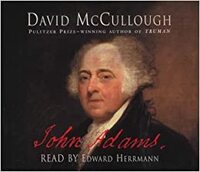Take a photo of a barcode or cover
informative
inspiring
medium-paced
informative
medium-paced
Outstanding
An absolute must-read if you’re interested in early American history and the American Revolution. The story of John Adams is completely captivating, and I enjoyed every page of this book.
An absolute must-read if you’re interested in early American history and the American Revolution. The story of John Adams is completely captivating, and I enjoyed every page of this book.
emotional
funny
hopeful
informative
inspiring
reflective
sad
tense
slow-paced
Review of John Adams
By: David McCullough
John Adams was a strong advocate for American independence and struggled a lot as our second president coming after George Washington, who was beloved by many. McCullough dives deep into who Adams was as person and the role he played in his forming of America. Adams had his faults with his temper, his intellectual vanity, and his stubbornness, but he was a man with strong moral beliefs and convictions. His integrity remained intact despite enemies firing on all sides during the revolution and while he was president. I also loved his relationship with Abigail because there was such respect between them, and I appreciated how loyal he was to her. Adams made his own decisions, but almost always asked for her opinion. On the other hand, his relationship with Jefferson was complicated and messy. There was respect and love between them, but their opposing views got between in the way. They were in a way the equivalent of frenemies and you could also compare their relationship to Hamilton and Burr. Fortunately, Adams and Jefferson were able to mend fences, and funnily enough, they had a mutual distrust for Hamilton, who was a threat to both. Unfortunately, when we got to the Adams administration, I was reminded that politics hasn’t changed much, we just now have the internet and television to spread the chaos and slander. Adams is a figure to be admired and respected as this book highlights his accomplishments and what he did for our country and becoming president to a newborn nation is not an easy feat. Maybe not all his decisions were the best, but he did what he believed was right and the man had no regrets. Despite how long it took me to read it was easy to read biography on Adams.
It was interesting to read this after having read Hamilton because it offers such different perspectives on these fascinating people and brings them down to earth. I took my kids to John Adams’s birth place and house last year and learned a lot about this man there. This only enhanced that understanding and “shifted the narrative” further about a man whose humility has ultimately caused him to be overlooked and his impact forgotten.
This book was a BEAST! I listened to the audio version, and it was excellent but I did have to check it out multiple times to get through it. There were multiple times I was surprised or impressed about something in Adams’s life. It was a good portrayal of a man who was flawed, and a country with growing pains. I think it was a fair discussion of other historical figures like Thomas Jefferson and Alexander Hamilton with some leaning towards Adams’s feelings of course.
You can tell that preserved letters make up the bulk of the basis for this book. Will electronic correspondence of important figures be as well maintained?
I also had recently read a historical fiction story of the same period (around revolutionary war) and it was fascinating to have people the characters met in the fiction be discussed in this book.
You can tell that preserved letters make up the bulk of the basis for this book. Will electronic correspondence of important figures be as well maintained?
I also had recently read a historical fiction story of the same period (around revolutionary war) and it was fascinating to have people the characters met in the fiction be discussed in this book.
Bookended by George Washington and Thomas Jefferson, John Adams finally gets the biography he deserves, in the safe hands with David McCullough. I read this book for my annual president’s day picked, having already read Chernow’s Washington and Meacham’s Art of Power. I didn’t know much about the second president, but McCullough gives us a very detailed, sympathetic account to a man often overlooked in American History.
Criticized for being to bourgeois, sympathetic to London, prone to giving way to his temper and mocked for his short stout nature, Adams is portrayed by McCullough as a fervent patriot, a great talker, and a man who consistently puts his nation ahead of interests — though with more outwardly ambition than Washington or Jefferson, perhaps, Adams also fits the role of a reluctant leader serving his country because his country needed him.
Ironically, though Adams was portrayed as wealthy and out of touch, the democracy he envisioned was cast him as way more a man-of-the-people than the agrarian Jefferson. These parallels between Jefferson and Adams are fascinating: The close ties during the revolution, the fallout in Europe than back home, the long silences and finally, the renewed friendship.
What Jefferson was to Virginia, Adams was to Massachusetts, writing the Massachusetts Constitution, which served as a guideline for basic democratic principles for the country as a whole. As Jefferson served as ambassador to France, not an easy job, Adams served as ambassador to Great Britain, perhaps an even harder job, having just revolted against the country and attempting to establish diplomatic ties and avoid war.
Meanwhile, Adams also secured the allegiance of the Holland during the infant and tumultuous post-war years of the young nation. What happened in both Paris and Holland, representative of the relations with Europe overall, could be considered some of the greatest victories in the early stages of American Democracy, ensuring an easier future for the young nation.
Still, McCullough echoes a common theme in this book, even after those victories: “Adams once again fell into a black mood… he felt Congress had forgotten him.”
Adams rivals played a big part in this narrative, notably Ben Franklin, whom Adams considered too relaxed and somewhat incompetent in Europe, and Alexander Hamilton, whom though he shared a party loyalty with Adams was much more radical in his beliefs and outwardly more ambitious, political, and critiquing as well. Adams ability to deal with this unrest within his own party is a testament to his leadership, his ability to put country above party, and perhaps most importantly, his calm, rational nature in the early years of the American democracy — has Adams lost his cool or taken the war-hawking advice and spirit of Hamilton, he could have risked the future of the union. Then there was the Anti-Federalists: passive Jefferson and the more aggressive Madison, who undercut Adams every chance he got.
Adams greatest accomplishments were probably his avoidance of war, his buildup of the Navy, his maintaining good relations with both Britain and Napoleonic France, even during trying times of uncertainty, and his unwavering trust in the future of American Democracy, no matter the personal or political costs. He was a hard thinker, reflected often, read much, studied law and classics, respectful and passionate of democracy and one of the most passionate adovcates of the American Revolution, at times self-deprecating, believed strongly in education, and his view on life reflected these values and these interests.
McCullough does what many great historians are able to do: illustrate the early time of American democracy, how close we were to war and division, and center it around a man of unwavering principle and belief in the future of democrat. For Adams that meant a man of high morals, integrity, gumption and values, above all sacrifice. He led a nation through uncertain times, the forgotten leader amid an early democracy with many notable egos.
Criticized for being to bourgeois, sympathetic to London, prone to giving way to his temper and mocked for his short stout nature, Adams is portrayed by McCullough as a fervent patriot, a great talker, and a man who consistently puts his nation ahead of interests — though with more outwardly ambition than Washington or Jefferson, perhaps, Adams also fits the role of a reluctant leader serving his country because his country needed him.
Ironically, though Adams was portrayed as wealthy and out of touch, the democracy he envisioned was cast him as way more a man-of-the-people than the agrarian Jefferson. These parallels between Jefferson and Adams are fascinating: The close ties during the revolution, the fallout in Europe than back home, the long silences and finally, the renewed friendship.
What Jefferson was to Virginia, Adams was to Massachusetts, writing the Massachusetts Constitution, which served as a guideline for basic democratic principles for the country as a whole. As Jefferson served as ambassador to France, not an easy job, Adams served as ambassador to Great Britain, perhaps an even harder job, having just revolted against the country and attempting to establish diplomatic ties and avoid war.
Meanwhile, Adams also secured the allegiance of the Holland during the infant and tumultuous post-war years of the young nation. What happened in both Paris and Holland, representative of the relations with Europe overall, could be considered some of the greatest victories in the early stages of American Democracy, ensuring an easier future for the young nation.
Still, McCullough echoes a common theme in this book, even after those victories: “Adams once again fell into a black mood… he felt Congress had forgotten him.”
Adams rivals played a big part in this narrative, notably Ben Franklin, whom Adams considered too relaxed and somewhat incompetent in Europe, and Alexander Hamilton, whom though he shared a party loyalty with Adams was much more radical in his beliefs and outwardly more ambitious, political, and critiquing as well. Adams ability to deal with this unrest within his own party is a testament to his leadership, his ability to put country above party, and perhaps most importantly, his calm, rational nature in the early years of the American democracy — has Adams lost his cool or taken the war-hawking advice and spirit of Hamilton, he could have risked the future of the union. Then there was the Anti-Federalists: passive Jefferson and the more aggressive Madison, who undercut Adams every chance he got.
Adams greatest accomplishments were probably his avoidance of war, his buildup of the Navy, his maintaining good relations with both Britain and Napoleonic France, even during trying times of uncertainty, and his unwavering trust in the future of American Democracy, no matter the personal or political costs. He was a hard thinker, reflected often, read much, studied law and classics, respectful and passionate of democracy and one of the most passionate adovcates of the American Revolution, at times self-deprecating, believed strongly in education, and his view on life reflected these values and these interests.
McCullough does what many great historians are able to do: illustrate the early time of American democracy, how close we were to war and division, and center it around a man of unwavering principle and belief in the future of democrat. For Adams that meant a man of high morals, integrity, gumption and values, above all sacrifice. He led a nation through uncertain times, the forgotten leader amid an early democracy with many notable egos.
informative
inspiring
reflective
slow-paced




